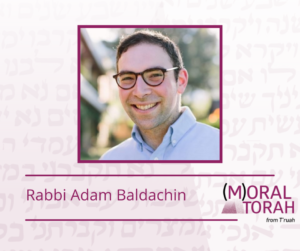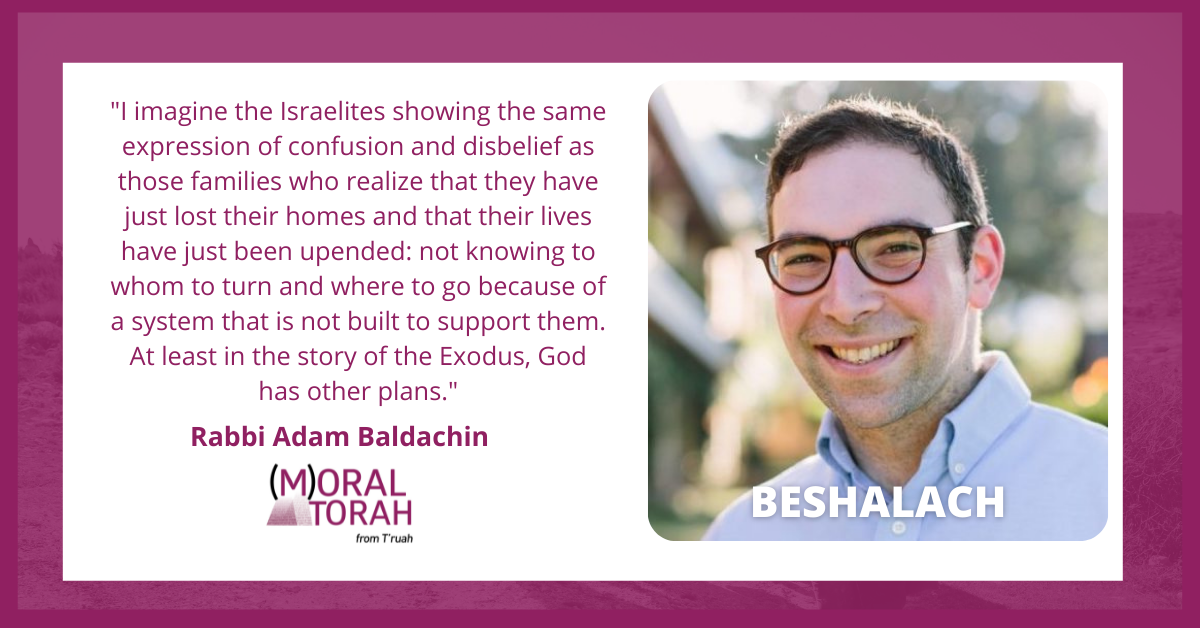A D’var Torah for Parshat Beshalach by Rabbi Adam Baldachin
Imagine this harrowing scene: empty strollers line the hallway outside a courtroom as families stand before a judge and within minutes are evicted from their homes in quick succession, their lives upended in the blink of an eye.
Homelessness can cause a psychological trauma that spans generations. Those that experience eviction lose their independence and dignity and suffer serious health consequences from the ongoing impact of the trauma. This heartbreaking reality for Americans is widespread. According to the National Alliance to End Homelessness, in January 2020, shortly before COVID-19 hit, there were 580,466 people in America experiencing homelessness, 30% of whom were families with children, and 6% unaccompanied youth (under age 25). In a recent New York Times op-ed, Lori Teresa describes her own experience facing devastating financial loss leading to the traumas of homelessness. The support she received from a counseling service called Journey of Hope helped her to advocate for herself and find her freedom from crushing debt. Without that support, she could not have climbed out of the dark hole in which she found herself.
Stories such as Lori’s remind us of our moral responsibility to support those facing eviction and defend the concept that housing is a basic human right, which must be protected by law. In Westchester County, where I currently live, evictions from rental housing are a county-wide disaster. In 2019, there were close to 10,000 eviction petitions filed in the county. In that year, 4,960 people entered the Westchester homelessness system, out of which 2,911 people were new to the system.
Sign up to receive (M)oral Torah in your inbox each week.
There is currently a gross inequity in power between landlords and tenants, which maintains the status quo. Unrepresented tenants unknowingly sign agreements that result in their families becoming homeless. Tenants have many defenses to non-payment and holdover proceedings that they cannot assert without a lawyer, including improper rent charges, incorrect amount of rent owed, warranty of habitability, improper notice, and violations of federal law. Lawyers can negotiate fair settlements with landlord attorneys and steer clients to financial resources to prevent eviction and homelessness. However, in an average year, 93% of landlords are represented by counsel, while only 7% of tenants have attorneys.
In responding to this challenge, I have joined a coalition of over 15 organizations and individuals working towards the creation of a Right to Counsel program in Westchester, NY, to ensure attorney representation for tenants facing eviction. Our coalition is working with our legislators to adopt a Right to Counsel program, which, in other states, has ensured that tenants have the legal support they need to ensure that equity is maintained in housing court. We are hopeful that Westchester County’s 2021 budget includes funds to conduct a study on the cost of a county-wide program providing a right to counsel in eviction proceedings. We will continue to advocate for this important program to protect our most vulnerable neighbors.
In this week’s parashah Beshalach, we read the climactic account of the Exodus story — the moment when a people, enslaved, attempt to break out of a system that keeps them imprisoned physically, mentally, and spiritually. Pharaoh knows that the people face a dead end: “They are confused in the land; the wilderness has closed in on them.” (Exodus 14:3) Abraham Ibn Ezra, the 14th century Spanish commentator, explains this as “they are like a person who cannot find anyone to advise them and does not know what to do.”
I imagine the Israelites showing the same expression of confusion and disbelief as those families who realize that they have just lost their homes and that their lives have just been upended: not knowing to whom to turn and where to go because of a system that is not built to support them.
At least in the story of the Exodus, God has other plans. God shows the Israelites the way forward by providing them with a pillar of fire and cloud, guiding them and urging them forward, providing a path forward that they couldn’t see on their own. God reminds Moses and the Israelites that God is with them, giving them strength and the ability to move toward their eventual freedom with courage and purpose.
Find more commentaries on Beshalach.
We see this message to the Israelites and, by extension, to all of us, in the beginning of the parshah when God leads the people out of Egypt in a roundabout way, “ki karov hu” “because it is close.” (Exodus 13:17) While a number of medieval commentators explain this as a way of ensuring that the Israelites don’t give up on their freedom and turn back towards Egypt, Yehudah Aryeh Leib Alter, the Sefat Emet (19th century Polish Chasidic Rebbe) sees this as a divine promise to remain “karov” “close” to Jewish people through future exiles. According to his reading, this verse is a promise to Jews that God will remain close to them through confusing times, when they feel lost and can’t see a way forward. When they experience their ancestors’ sense of hopelessness, they can read this story and be encouraged that God will help them confront whatever challenge they are currently facing.
 May we also gain the courage to open our eyes to the needs of others struggling under the burden of homelessness. Perhaps there are ways we can remain close to them by connecting with others and advocating for systems of equity to help our most vulnerable populations navigate difficult paths.
May we also gain the courage to open our eyes to the needs of others struggling under the burden of homelessness. Perhaps there are ways we can remain close to them by connecting with others and advocating for systems of equity to help our most vulnerable populations navigate difficult paths.
Rabbi Adam Baldachin serves as the Rabbi of Shaarei Tikvah, a Conservative Congregation in Scarsdale, NY. Originally from New Providence, NJ, Rabbi Baldachin received his B.A. from List College (Columbia and JTS) and received his ordination at JTS, where he participated in the Gladstein Fellowship in Entrepreneurial Rabbinic Leadership. Rabbi Baldachin is currently a senior rabbinic fellow at the Shalom Hartman Institute and recently launched a podcast with a local group of clergy called The Clergy Pod.

